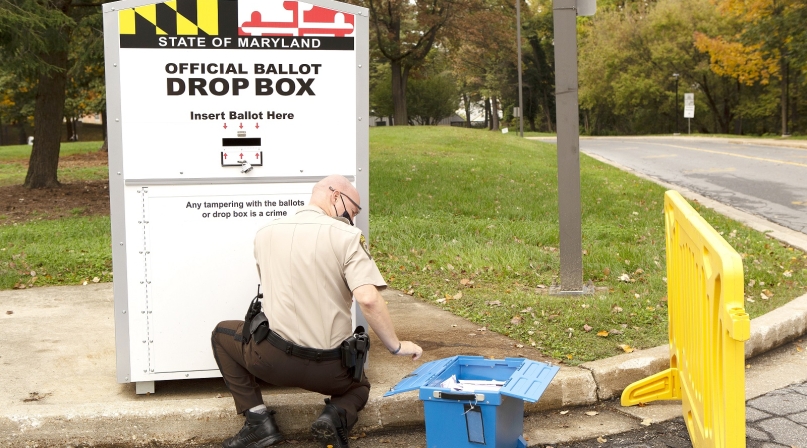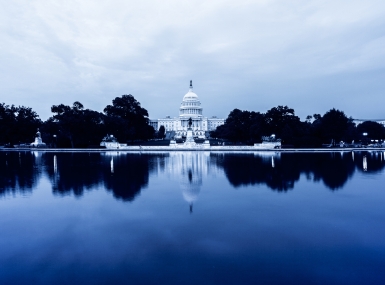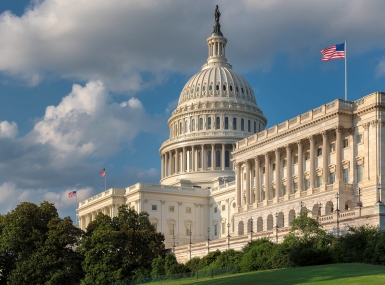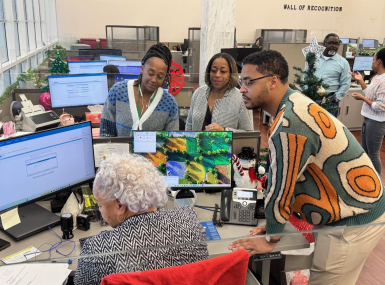Changing times lead to challenging days for elections workers

Key Takeaways
After years spent toiling in obscurity, election officials are getting the spotlight.
And they hate it. They don’t want it.
The partisan rancor that accompanies political campaigns, fueled by misinformation, has caused collateral damage to infrastructure and people surrounding the elections, and elected officials and their staffs alike are facing abuse and threats. Professional associations that once focused on software updates and poll worker management are now becoming peer support groups for rattled registrars.
Chris Harvey was the elections director for Georgia Secretary of State Brad Raffensperger for six years, a second career after working in law enforcement in Fulton and DeKalb counties.
“In 20 years as a police officer working homicide in Atlanta I never was ever threatened, but I received death threats after the 2020 election, right before the Senate runoff,” he said during NACo’s 2022 Annual Conference. “It took leaving the police world and going into the elections before my life was threatened. I had to have the police outside of my house.”
Harvey has returned to law enforcement and is now deputy director of the Georgia Peace Officers Standards and Training Council.
For all of the legal challenges launched at American election processes over the years, none have come up with more than one-off election law violations. They’re typically people trying to vote twice, or forge a signature on an absentee ballot, and they come to light because the safeguards have worked. Yet rumors abound and aggrieved losing candidates lash out like a pinball player throwing his weight against the machine for a favorable bounce.
“Since November 2020, the losing, disappointed parties have responded with denial, blame, interference and threats of violence,” retired Fairfax County Elections Director Scott Konopasek wrote to the Senate Judiciary Committee in July. “No one was prepared for the threats of physical violence to election officials and family members, the threats to professional credibility and the threats to livelihoods that followed the presidential election and which continue still.”
A survey by the Brennan Center for Justice found 77 percent of election officials believe threats against them have increased in recent years, with one in six reporting having been threatened because of their jobs, mostly over the phone, though half of those did not report the threats to law enforcement. One in five election officials reported that they were somewhat unlikely to stay in their jobs through the 2024 election, though more than half of all respondents were at least somewhat concerned that their successors might believe that widespread fraud occurred in the 2020 election.
The turnover in election officials hasn’t spared a demographic, affecting urban and rural counties alike across the country. The six most populous counties in Georgia have lost their elections directors. Increasingly, counties where election results have not been in doubt are seeing tensions rise.
The entire three-person staff of the Gillespie County, Texas elections department resigned in August, citing unspecified threats over the prior 18 months after a lopsided 2020 result. The small county still does not list a director of elections.
One third of Brennan Center survey respondents who indicated plans to leave in the next two years said that too many political leaders are attacking a system they know is fair and honest, and nearly as many said their job as an election official added a lot of unnecessary stress.
Leslie Hoffman laughed off calling the sheriff when she got two phone calls in one day from friends, recounting seeing Facebook posts about her work as the Yavapai County, Ariz. recorder.
“They wanted to make sure that I had protection, that I had my doors locked. Both of them offered to come and stay with me that night because they said they had read some nasty things about me after the 2020 election,” she said. “The next morning, I was telling my chief deputy about it, and she told me to call the sheriff. She said if I didn’t do it, she would.”
What Hoffman thought was just a little social media dustup would turn into a storm that forced her out of office in July.
“I’ve lived here my entire life and I’ve had the same cell phone number for 30 years,” she said. “It turns out these were people I’ve known for decades, and if they had a question to ask me about how the elections are run, they could have called me directly. They weren’t interested in that, in a conversation.”
The sheriff would drive by her house once a day, but he wasn’t the only one visiting her neighborhood. For months, unknown cars would slowly cruise down her block at night. Emails started coming in via untraceable accounts: “You better watch your back. “We have you now.” “You should be in jail.” “You should be lynched.”
It didn’t make any sense to her — the 2020 election was not in doubt in her county. If any election-related agenda item was on the Board of Supervisors agenda, the protesters would come out in droves and deputies would be on hand.
Finally, an incident near her home indicated to Hoffman that the danger was expanding to her friends, neighbors and pets. She resigned, and soon after, the pressure abated. The elections director, appointed by the supervisors, also resigned after harassment.
“I am still very cautious when I’m at home, I’m still looking out for cars driving up and down my block,” she said. “But people have moved on, they’re going after the people in office now. They just take a pack animal mentality. I’m able to relax a little, but for more than a year I really couldn’t.”
Now working in another county, it’s exhausting for Hoffman to imagine the high-profile job she once held, but she remains in awe of the work her colleagues do across the country in spite of the acrimony.
“I’m not sure what their [people who are harassing election officials] goal is, but it’s all a distraction campaign to keep you from doing your job,” she said. “If they keep it up, it’s going to drive people out of election work, but they don’t understand why we do it. [Elections workers] don’t want any particular candidates to win, we just want our audits to come back clean. We want to do a good job running elections.”
How did it get this way?
Noah Praetz, now a private consultant, worked for Cook County’s elections department in a variety of roles for 19 years and traced the increase in public scrutiny at NACo’s 2022 Annual Conference.
“We called it the ‘wedding planner era’ of elections,” he said of 2000, when he started. “The elections were on one day, you bring people and stuff together, throw a party, put it to bed at night.”
The wake of the 2000 election ushered in a 16-year era of legal compliance and technology requirements.
“Then the Russians got involved in 2016 and we recognized the threats that foreign adversaries could play, getting inside of our heads, threatening to get inside of our networks in elections,” he said.
The COVID-19 pandemic in 2020 added another weight on the backs of elections officials. Sports arenas, mostly vacant while gathering restrictions limited fan attendance, became metropolitan voting centers thanks to the space they offered for physical distancing. Months before vaccines were available to the general public, voting by mail became the easiest way to relieve congestion in polling places, staffed heavily by older adults who were more vulnerable to the virus.
And it worked. In Durham County, N.C., for example, 92 percent of voters cast their ballots by mail or via drop boxes.
“I think it mitigated a lot of what we had to control on Election Day just because of the limited numbers of individuals that voted in 2020,” said Derek Bowens, Durham County’s director of elections.
With that ease of voting came a longer processing time to count the votes, particularly in states like Pennsylvania that forbid its elections workers from canvassing mail-in ballots ahead of election day. The Keystone State decided the presidential election, after being called four days after Election Day.
Some states, however, allowed counties to canvas ballots ahead of time, and the lack of uniformity fed suspicions that a fix was in.
That was the first time the enormity of the problem appeared to Joe Gloria, registrar of voters for Clark County, Nev., where nearly three-quarters of the battleground state’s population lives.
“It became very clear that what we needed to make sure we were reaching out to our employees, providing a safe environment literally in that we had to get law enforcement to escort them from the employee exit to their cars, because it was not unusual on a daily basis for us to have about 100 protesters not more than 100 feet away from our front door,” he said. “Nevada is an open-carry state, so it was a little scary for them, because we had people who were out there carrying weapons.”
Likewise, Adams County, Colo. has spent more than $50,000 remodeling its clerk’s office to provide physical barriers for employees.
“We’ve had a number of different instances in our office with irate voters to the point where we no longer will just allow the public into our office,” said Josh Zygielbaum, Adams County, Colo. clerk and recorder.
Zygielbaum said the threats had subsided throughout this past summer, but he anticipates an increase ahead of the 2024 election.
Even though Johnson County, Mo. hadn’t received any election-related threats as of July, Clerk Diane Thompson was had her eye on security improvements, she wrote to the Senate Judiciary Committee, including practicing active shooter drills, devising an Election Day evacuation plan and establishing safe areas for her staff.
Coordination with law enforcement
County election workers are approaching the 2022 midterm election with trepidation.
“It’s only a matter of time until someone is injured or worse,” said Ingham County, Mich. Clerk Barb Byram. She counts herself fortunate to not have received any threats or heard of anything reported by her staff, but a fellow clerk’s story typifies the feeling of powerlessness county elections personnel feel.
A fellow Michigan county clerk received a threat that her pizza would be poisoned, but the threat was deemed uncredible, Byram relayed. Police deemed the threat uncredible, Byrum related, because the person who made the threat did not work for a pizzeria.
Zygielbaum said law enforcement has to walk a fine line investigating threats.
“During the 2020 election, we received lots of things that we would consider to be veiled threats, they weren’t actually direct threats and so the issue is, what I’m told, is that prosecutors are reluctant to actually prosecute because it’s difficult to convict and it falls under First Amendment rights. You can tell somebody that you’re going to, you know, do something to their family, but unless you get specific about it and provide the details of how and when it’s going to happen, there’s not much that can happen in those instances.”
With experience in both elections and law enforcement, Harvey is quick to credit both with knowing their own realms but lacking when it comes to coordination.
“Law enforcement doesn’t realize that voting is going on for about a month, public testing is going on before that and afterwards you’ve got about a week or two weeks of certification and audits and recounts and all that stuff,” he said. “If law enforcement was planning for an event like the Super Bowl or the [MLB] All-Star Game, law enforcement would be planning for months if not years to host something like that. They would have all their transportation that has all their communication, they’d be holding these summits, they would be doing all this kind of stuff. But with elections, it’s like ‘Well, is there an Election Day? I guess we better hit the streets.’ They’re not thinking the same way.”
Harvey acknowledged that crime and public safety don’t start and stop at elections’ convenience, but there are logistical considerations that could make law enforcement more flexible.
“The police would not want to have their bomb-disposal team training in another state on Election Day,” he said. “You don’t need to have your SWAT team in a polling place [but] do you want them on standby? Or in a position where they could respond if you get a bomb threat or if you get something like that?”
Harvey suggested county elections offices and law enforcement agencies designate liaisons who check in regularly, developing long-term partnerships. Tarrant County, Texas Elections Administrator Heider Garcia suggested to the Senate Judiciary Committee that legislation should protect the addresses of elections officials.
“While some may argue that our job exposes us in one way or another as public officials, it is not fair that our families are exposed and subject to threats,” he wrote in July. Congress has taken notice. The Election Worker Protection Act, introduced in September, would authorize the U.S. Election Assistance Commission to make grant funds available to states (and counties should their respective state opt not to apply for funding) for:
- the recruitment and training of poll workers and election volunteers
- physical security services and social media threat monitoring for election workers
- grants for state and local governments to establish or expand programs designed to protect the personally identifiable information of election workers
- make the harassment and “doxxing” of election workers’ efforts a federal offense, as well as the intimidation of tabulation, canvas and certification
- ensure that the U.S. Department of Justice offers training and resources to assist federal, state, local and tribal law enforcement agencies in understanding, detecting, deterring and investigating threats to election workers
- allow state or local election officials to remove poll observers from a polling location or location where votes are processed, scanned, tabulated or canvassed for a federal election if the observer has engaged in intimidation, deceptive practices or disrupted the vote counting process.
Despite all she’s faced in the last two years, Leslie Hoffman is still optimistic about the work county elections personnel do, as is her boss, Maricopa County Recorder Stephen Richter.
“I am blessed with an incredibly supportive county, a fantastic big brother who looks after me in our County Sheriff Paul Penzone, wonderful local police departments and a vigilant Arizona Department of Homeland Security (among others). Most of all, I am blessed with a wonderful team that is religiously committed to the preservation of democracy.”
Attachments
Related News

MEGA Act moves in House; NACo raises county concerns
On Feb. 10, the U.S. House Committee on Administration held a hearing to consider the Make Elections Great Again (MEGA) Act (H.R. 7300), which was introduced by Committee Chairman Rep. Bryan Steil (R-Wis).

House passes SAVE Act; Major impacts on county election administration
Next week, the U.S. House of Representatives is slated to vote on the Safeguarding American Voter Eligibility (SAVE) Act (H.R. 22), making it the chamber’s second vote on a version of the legislation in less than a year.

